Posts Tagged ‘Poetry Friday’
February 8, 2013 @ 6:23 pm | Filed under:
Poetry I loved this post at Barb Riley’s Written Not With Ink about “white space” in art and poetry, “the things unfinished and things left unsaid.”
“I’ve been spending more time reading poetry lately, and finding myself drawn to the absence of explanation on the page. In an age where answers are one millisecond away by the gods of google, my soul longs to contemplate the unknown.”
The gods of google, indeed, our magic answer machine supplying the ends of questions even before we’ve finished asking them.
The post reminded me of a poem from my MFA thesis, which I’ll share here because it’s Friday, and Friday is for poems. The challenging thing, for me, about sharing poems I wrote long ago is resisting the temptation to get in there and tinker some more, but I’ll resist and present this as I wrote it at age 23.
***
Negative Space
Still new at this, I cannot grant my hand
The freedom Porter’s “stroke” and “glide” suggest;
I’m scared to wreck a curve with poor command
Of pencil. “Loosen up!” he barks. “It’s just
A sketch. In here there’s no such thing as ‘messed
Up’.” But that bristly frown belies
Him. I lose the body’s edge. And paper snags
My lead; now nervous dashes fleck the sides
Of my drawing’s head. Above her sausage legs
And torso jut two arms like long thin bags
Of bread, lumpy and stiff. At least—thank God—
The model’s clothed. Too much, to spoil the grace
The undraped body wears.
……………………………………..Start over. See not
The model but the shape she prints on space,
My gentle dream instructor guides. Just trace
The edge your eye perceives. Porter fades
Like graphite dust—for just a flicker,
I can see it—No—It’s lost. He strides
To easel, flashes out an arm. The figure
Rippling from his charcoal pencil lifts her
Perfect arms and twirls and sings, “Like this!
Like this!” That’s it. I’ve had enough.
I snatch up my things.
My stool rings out against the floor,
Porter’s like a grizzly in the doorway.
Something shifts—the light, my gaze—
I’ve a sudden view of him an empty white,
A pattern cut from cloth of students, tables, wall.
The blank slivers of his beard pierce the quiet air.
Astonishing and lovely is the shape he’s left behind.
***
This week’s Poetry Friday roundup appears at A Teaching Life.
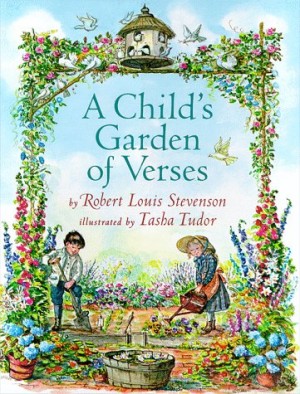 When the big ones were little, we got the Child’s Garden of Songs CD (like every other Charlotte Masonish homeschooler in the country), and oh how those small girls of mine adored it. For years it was their most frequently requested music, especially at bedtime–especially in summer. 😉 We got the beloved Tasha Tudor-illustrated picture-book-sized edition of Child’s Garden of Verses, too, of course: another CM requisite. My girls liked the book well enough, but it was the CD they cherished, and it’s the CD they still recall with affection, and hum around the house from time to time. Those lovely Celtic-flavored melodies got into my blood, too; that’s the kind of music I love best; it stirs my heart, gives me the shivers.
When the big ones were little, we got the Child’s Garden of Songs CD (like every other Charlotte Masonish homeschooler in the country), and oh how those small girls of mine adored it. For years it was their most frequently requested music, especially at bedtime–especially in summer. 😉 We got the beloved Tasha Tudor-illustrated picture-book-sized edition of Child’s Garden of Verses, too, of course: another CM requisite. My girls liked the book well enough, but it was the CD they cherished, and it’s the CD they still recall with affection, and hum around the house from time to time. Those lovely Celtic-flavored melodies got into my blood, too; that’s the kind of music I love best; it stirs my heart, gives me the shivers.
Now and then I’ll realize suddenly that there are these books and songs that meant the world to us ten, twelve years ago (Amazon informs me I purchased the Tasha Tudor book on April 14, 2000—six years to the day before Rilla was born; gosh, even before Beanie was born; and now I’m a little whelmed by the thought that in some respects, Amazon has a better record of my family history than I do)—important to us years ago, I was saying, but my younger trio don’t know them at all. It happened with Miss Rumphius (heresy!) and it happened with Child’s Garden of Songs.
I realized this a week or two ago and tracked down the CD, and we’ve listened to it every couple of days since. Rilla and Wonderboy are as enchanted by its melodies as their big sisters were. Huck remains somewhat indifferent, but then there aren’t any songs about trucks, are there?
The large book with the Tasha Tudor illustrations has failed to jump out from any of the shelves on which I’d expect it to be residing. All I found was the little Dover paperback edition, print only, no pictures; but Rilla doesn’t care. She sprawled on my bed today, frantically hunting each of the poems during the opening measures of its corresponding song on the CD—pause, Mommy, I can’t find it! oh here it is—and then calmly, almost serenely, singing along, kicking her feet, looking up to identify various instruments in the musical arrangement. Guitar, piano, violin, a fluty thing, those little round things you wear on your fingers, more violin, maracas. It was supposed to be my quiet reading time but I gave up on my book and watched her instead. It was a fancy dress day; she likes her sash tied in a fastidious bow, but she scorns anything that binds or tames her hair. The ragged locks fell over her face as she peered down at the book. Amazon says I purchased the Garden of Songs CD on July 19, 2002. Jane was seven that June. You know, last week.
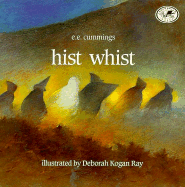 The other book Rilla wanted today—wanted fiercely, rejecting my offer of the next Brambly Hedge story—was hist whist, the little paperback picture book that is an e.e. cummings poem set to pictures. Beautiful, haunting, Halloweenish paintings by Deborah Kogan Ray, whose bibliography I must remember to look up. Her work here is exquisite. If I had a second copy, I’d take it apart and hang up the pictures each October. I don’t have to look to Amazon for a record of how this one came to us; it’s a Dragonfly Book, which means I probably picked it up on the giveaway table when I worked at Random House/Knopf. Scott and I have loved this book forever. The language of the poem is marvelously rich, cummings at his best:
The other book Rilla wanted today—wanted fiercely, rejecting my offer of the next Brambly Hedge story—was hist whist, the little paperback picture book that is an e.e. cummings poem set to pictures. Beautiful, haunting, Halloweenish paintings by Deborah Kogan Ray, whose bibliography I must remember to look up. Her work here is exquisite. If I had a second copy, I’d take it apart and hang up the pictures each October. I don’t have to look to Amazon for a record of how this one came to us; it’s a Dragonfly Book, which means I probably picked it up on the giveaway table when I worked at Random House/Knopf. Scott and I have loved this book forever. The language of the poem is marvelously rich, cummings at his best:
little hoppy happy
toads in tweeds
tweeds
little itchy mousies
with scuttling
eyes rustle and run and
hidehidehide
whisk
You can see why Rilla asked for it five times in a row this afternoon. Five times. I had to smile: yesterday when I added it to our bookstack, she was disgruntled, didn’t think she’d like it. I just began reading it aloud, as if to myself, and by page three she had clambered up beside me and was rapt.
For our family, more than anything else it may be books that serve as our links to years past, our bridges back to the selves we were some time ago. Music, yes, especially for Scott, and for me the 80s tunes of my teens, or certain songs from the Bruce Springsteen mix tape Scott made for me that first summer after we started dating, when he was in Connecticut and I was back home in Colorado—but books are more numerous bridges for me. I’ll remember what bed or sofa we were curled up on, reading this novel, that picture book. The bay window in our Virginia house with Favorite Poems Old and New on its sill, behind the little brown table with the three tiny chairs; and out the window, a red cardinal on the bird feeder, bright against the snow. “Read it again!” they’d beg, shouting. “Page 36!”—The Thomas Hood poem they loved, still love, though now Huck, not Wonderboy, is the three-year-old “imp of mirth and joy” it depicts.
hist whist
little ghostthings
tip-toe
twinkle-toe
I think perhaps it isn’t only a Halloween poem after all…
* * *
{{Visit Poetry Friday at Paper Tigers}}
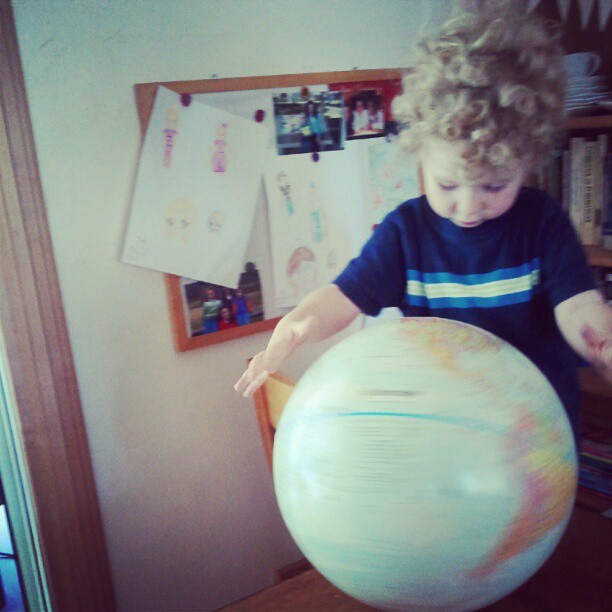
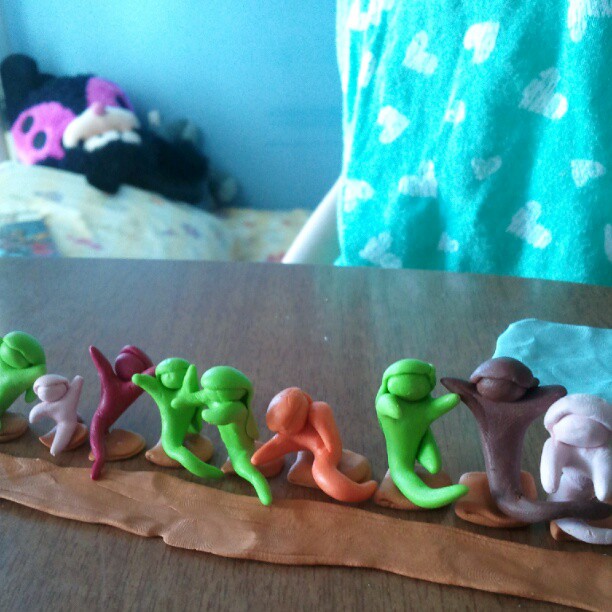


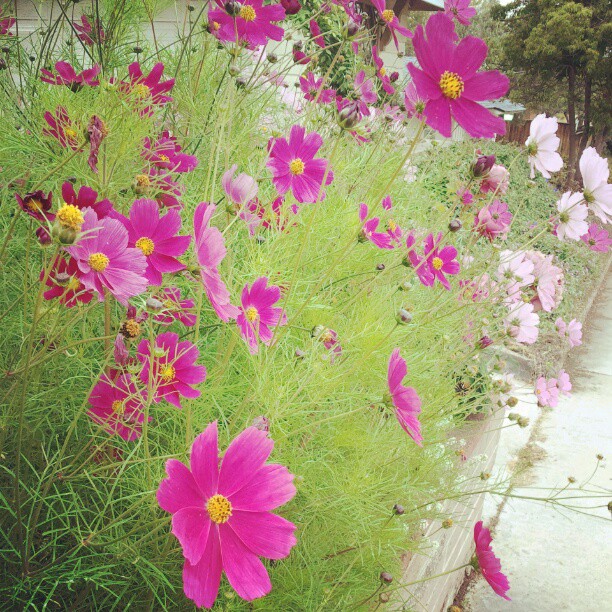

I do know how to pay attention, how to fall down
into the grass, how to kneel down in the grass,
how to be idle and blessed, how to stroll through the fields,
which is what I have been doing all day…
—from “The Summer Day” by Mary Oliver
March 30, 2012 @ 6:45 pm | Filed under:
Poetry 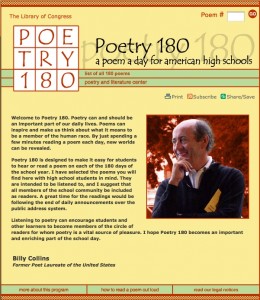 Yesterday I linked to a wonderful Billy Collins poem from the Poetry 180 website. That site’s a new discovery for me, but it’s been around a while and I feel like I must be the last poetry lover on the internet to learn about it. Just in case I’m wrong and you’ve missed it as well, here’s the link.
Yesterday I linked to a wonderful Billy Collins poem from the Poetry 180 website. That site’s a new discovery for me, but it’s been around a while and I feel like I must be the last poetry lover on the internet to learn about it. Just in case I’m wrong and you’ve missed it as well, here’s the link.
“The idea behind Poetry 180 is simple: to have a poem read each day to the students of American high schools across the country.”
We enjoyed the second poem today: “Sidekicks” by Ronald Koertge. Sparked a good discussion, and then we had to go look up all the cowboy-film sidekicks mentioned in the poem. I knew Gabby and Pancho, but wasn’t sure about Andy or Pat. The latter turned out to be Pat Buttram, who rode with Gene Autry. Here they are on YouTube (embedding’s disabled on the clip so I can’t post it here).
Gabby or Pat, Pancho or Andy remind us of a part
of ourselves,
the dependent part that can never grow up,
the part that is painfully eager to please,
always wants a hug and never gets enough…
I’m late to the party tonight, but here’s the Poetry Friday roundup, hosted this week by my juicy little universe.
July 8, 2011 @ 4:45 pm | Filed under:
Poetry 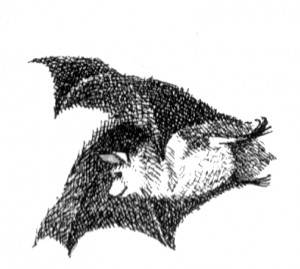 The bat-poet remembers his earliest days:
The bat-poet remembers his earliest days:
…And then the mother dances through the night
Doubling and looping, soaring, somersaulting—
Her baby hangs on underneath.
All night, in happiness, she hunts and flies.
Her high sharp cries
Like shining needlepoints of sound
Go out into the night and, echoing back,
Tell her what they have touched.
She hears how far it is, how big it is,
Which way it’s going:
She lives by hearing.
More Poetry Friday posts: Wild Rose Reader
More Bat-Poet moments
Rose petal, rock, leaf, bat
Her bat mood
February 11, 2011 @ 5:57 pm | Filed under:
Poetry Well, here it is Friday already, and I didn’t get that twenty-five miles of caged birds poem of mine typed up yet. Another Friday, then.
This morning the girls and I tried to read a bit of Gerard Manley Hopkins—a special favorite of mine; he won the heart of this freckled girl with “Pied Beauty” long ago—but we had already had a rather long read-aloud session which had exhausted the patience of my toddler, whose wooden animals began mysteriously to leap out of his fists and hurl themselves across the room.
Hopkins never had to contend with flying zebras.
He’d have seen the beauty in them, though, if he had.
Pied Beauty
Glory be to God for dappled things—
For skies of couple-colour as a brinded cow;
For rose-moles all in stipple upon trout that swim;
Fresh-firecoal chestnut-falls; finches’ wings;
Landscape plotted and pieced—fold, fallow, and plough;
And all trades, their gear and tackle and trim.
All things counter, original, spare, strange;
Whatever is fickle, freckled (who knows how?)
With swift, slow; sweet, sour; adazzle, dim;
He fathers-forth whose beauty is past change:
Praise Him.
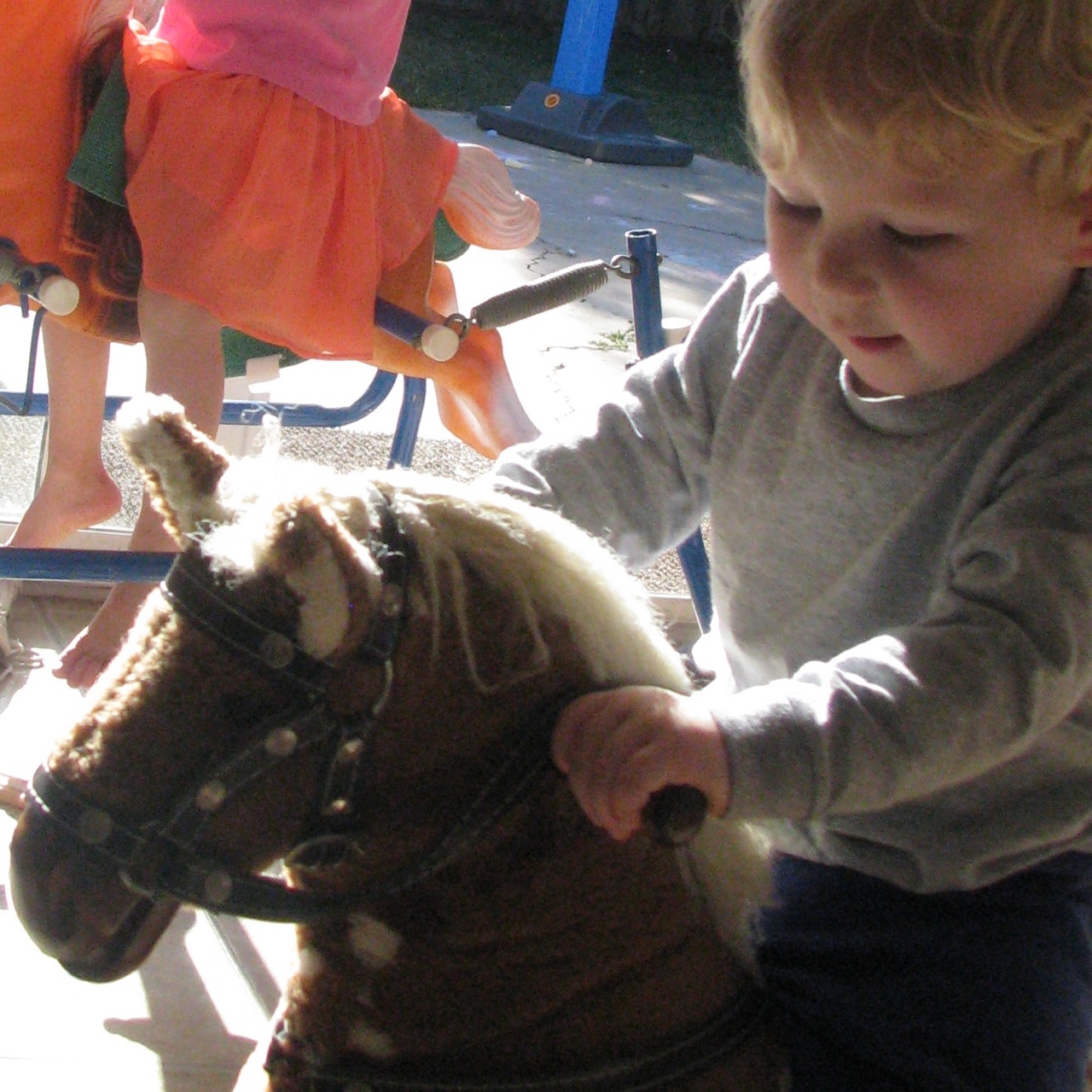
This week’s Poetry Friday roundup is hosted by the wonderful Carol Rasco from RIF.
February 3, 2011 @ 8:25 pm | Filed under:
Poetry OK, so every week as Poetry Friday approaches, I think: I should tell the caged birds story. But I never get around to it, because the story pretty much begs the posting of the poems the story is about. Which means I’d need to canvas my grad-school chums to see if any of them would let me share their poems-from-the- story here (if they can even find copies); and my own poem- from-the-story is about a mile long, and that’s a lot of typing.
Plus it’s always a bit agonizing to copy out a piece of your own writing, especially one from long ago—you keep finding things you’d like to tinker with, improve, polish up. At least, I do.
AND YET. It’s a great poetry story. So I’m going to tell it after all, and then maybe later I can ask some of my classmates for permission to share their poems, and maybe I’ll dig up my own poem-from-the-story for a future Poetry Friday.
So all right, one night during grad school (this was at UNC-Greensboro), a bunch of us MFA students were at a party together. Music, laughter, merriment. One of the poets—I think it was Susan Collings, or maybe it was Elizabeth Leigh Palmer? (now Hadaway)—was telling us about Moses Cone, 19th-century philanthropist, entrepreneur, and prominent citizen of Greensboro. One year, it seems, Moses gave his wife the rather remarkable present of twenty-five miles of carriage roads.
That’s what Susan (or Leigh) said, but one of the fiction writers got an intensely puzzled look on her face and said, “He gave her twenty-five miles of caged birds?”
We all laughed, but we were struck, too, by the image. Twenty-five miles of caged birds. For a moment we all fell silent, picturing it, I think, or savoring the magic of the strange phrase.
“It’s like something from a poem,” one of us said. And an idea seized us, a kind of game, a quiet joke we could play on our workshop professor, the brilliant Alan Shapiro. We would each write a poem that included the line “twenty-five miles of caged birds.” And we would all turn them in for workshop the next week, without saying anything about the exercise: we’d let Alan discover the repeated phrase as he read through the poems.
Well, we all went home and did exactly that. There were around ten of us in the workshop. Each of us wrote a poem, working the caged-birds phrase in somewhere, and turned them in for the next class’s discussion. Mine was, as I have mentioned, quite long: it was a framed story about a girl recalling a fairy tale her grandfather had once told to her mother, a variation on Hans Christian Andersen’s “The Nightingale.” The girl actually hears the story from her aunt, not her mother, and that’s part of the tension of the piece. In the grandfather’s version of the tale, the Emperor, having fallen in love with the exquisite song of the nightingale in his vast garden, orders up a hundred replicas in bronze, mechanical birds who sing mechanical songs, placed
“…at intervals in the garden from sea to palace:
twenty-five miles of caged birds and belled orchids.”
The morning of our workshop I was making photocopies in the writing program office when in ran Alan Shapiro. Alan is a dignified and serious person, not prone to running in excitement, but in this moment, he was both running and excited. He had read the first three or four poems and had been so struck by them that he just had to come share the moment with someone. Our program director, Jim Clark, was there, and I don’t remember if we had filled him in on the joke or not, but I remember his eyes twinkling as Alan explained his excitement. He’d read the first poem, and an odd line, the caged birds thing, had jumped out at him as a curious turn of phrase. In that first poem, he wasn’t sure to make of it, but in the next one—I remember he said this one was by Mary Elder, who wrote beautifully spare verses full of startling images—there was the same odd phrase, used in such a way that he decided it must be a figure of speech he was somehow unfamiliar with.
He described reading the next poem, and there it was again, and by now he was wondering what was up. And then he hit my poem, the fairy tale—and he thought, Oh! This must be the origin of the idiom! “Twenty-five miles of caged birds,” this peculiar figure of speech he’d never heard before, must have originated in the Andersen tale my poem reinterpreted.
As you can imagine, this tickled me no end, especially since the miles of mechanical birds were my own twist; in Andersen’s story there is the single artificial bird brought into the palace to outshine the real nightingale.
Well, Alan went back and read the rest of the batch of poems, and it didn’t take long before he realized he’d been pranked. We all howled like crazy at his recounting of events in workshop that afternoon. Our joke had come off even better than we hoped.
But the best part, really, was hearing all the poems—all so incredibly different, carrying the peculiar words into contexts that were oceans apart from each other. As fine a story as Moses Cone’s gift of carriage roads is—how delighted his wife must have been!—it was nothing compared to the distance traveled and the worlds conjured by those caged birds.
This week’s Poetry Friday roundup can be found at Dori Reads, about twenty-five miles down Caged Birds Road.
January 21, 2011 @ 7:31 am | Filed under:
Poetry A poem by Rilla, age 4 1/2.
Cup
Cup
can
drink
out
of
there
self
That is to say, “Cup can drink out of itself.” Got a bit of a zen-riddle quality, doesn’t it? Even more so, in the multicolor crayoned original.
 Today is Poetry Friday. Rilla was inspired to write a poem (this was one day last week) after Rose and Beanie and I had made one of our frequent visits to The Poem Farm. Amy’s funny, fresh, thoughtful verses make you want to start playing with words yourself.
Today is Poetry Friday. Rilla was inspired to write a poem (this was one day last week) after Rose and Beanie and I had made one of our frequent visits to The Poem Farm. Amy’s funny, fresh, thoughtful verses make you want to start playing with words yourself.
Today is also the Feast of St. Agnes—which, falling on a Friday, kind of begs a reading of Keats’s “The Eve of St. Agnes,” doesn’t it?
This week’s Poetry Friday roundup an be found at A Teaching Life.
December 31, 2010 @ 8:37 am | Filed under:
Poetry  These are poems that grabbed me this week. The Wendell Berry was quoted by Anne Lamott just after the Bird by Bird passage I posted on Wednesday. The Dickinson came my way in the recent New Yorker review of C. D. Wright’s One With Others, a book which sounds well worth seeking out.
These are poems that grabbed me this week. The Wendell Berry was quoted by Anne Lamott just after the Bird by Bird passage I posted on Wednesday. The Dickinson came my way in the recent New Yorker review of C. D. Wright’s One With Others, a book which sounds well worth seeking out.

Tell All the Truth
by Emily Dickinson
Tell all the Truth but tell it slant—
Success in Circuit lies
Too bright for our infirm Delight
The Truth’s superb surprise
As Lightning to the Children eased
With explanation kind
The Truth must dazzle gradually
Or every man be blind—

The Wild Rose
by Wendell Berry
Sometimes hidden from me
in daily custom and in trust,
so that I live by you unaware
as by the beating of my heart.
Suddenly you flare in my sight,
a wild rose blooming at the edge
of thicket, grace and light
where yesterday was only shade,
and once again I am blessed, choosing
again what I chose before.

This week’s Poetry Friday roundup can be found at Carol’s Corner.













